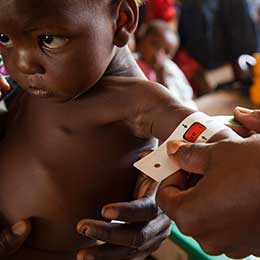Malnutrition exacts a significant human cost, in both emergency and non-emergency settings. FANTA helped governments and other stakeholders design, implement, and monitor nutrition information systems; respond to nutrition emergencies; improve resiliency to shocks; and better address chronic food insecurity. FANTA also worked to introduce, integrate, and scale up services in health systems for community-based management of acute malnutrition (CMAM)—a proven approach for effectively managing acute malnutrition—and has been instrumental in developing materials for and conducting specialized training in CMAM for health care workers.
Our work to address nutrition in emergencies and advance CMAM included:
- Providing technical assistance to USAID Missions and national governments for policymaking, program design, strategic planning, and monitoring and evaluation of nutrition programs.
- Increasing the understanding of severe acute malnutrition, through improved communications and better assessment tools to estimate the gravity, scope, and location of the problem.
- Supporting the costing of CMAM programs in Ghana and Malawi (report forthcoming) by utilizing the CMAM costing tool.
- Implementing the design, provision, and monitoring of CMAM and emergency nutrition training at all levels of the health system, from pre-/in-service training for medical personnel to clinic-based training for community health workers.
- Supporting training in the use of monitoring and evaluation and quality improvement methods to improve the quality of CMAM and emergency nutrition services at all levels of health systems.
- Conducting research on standardized mid-upper arm circumference (MUAC) cutoffs for pregnant women and adults, as well as research to test the safety of using MUAC as a discharge criterion for children admitted to CMAM programs, which could offer significant time savings for program staff.



